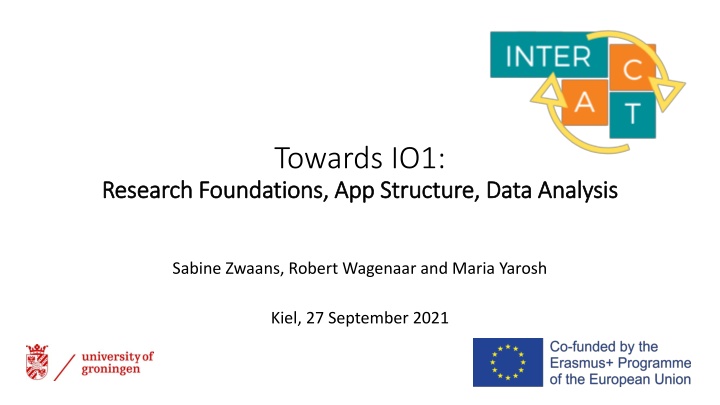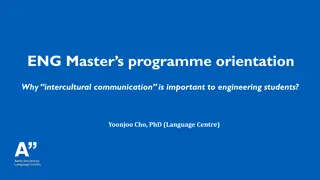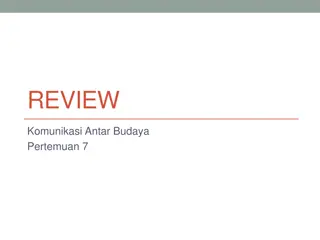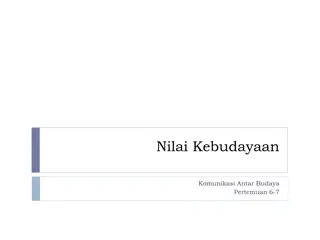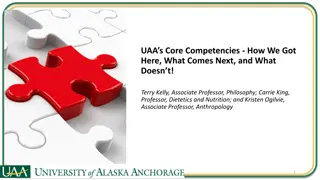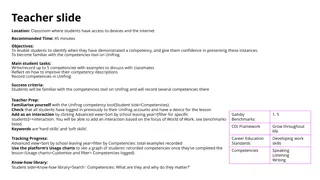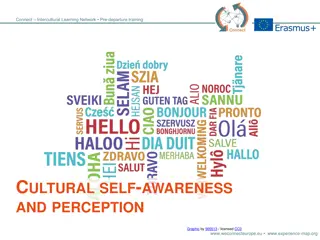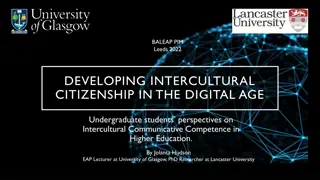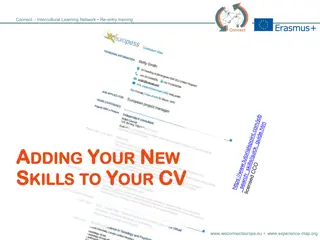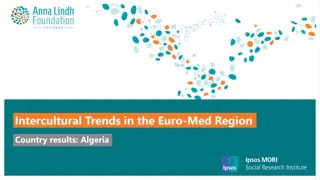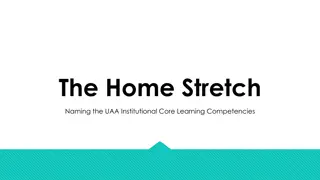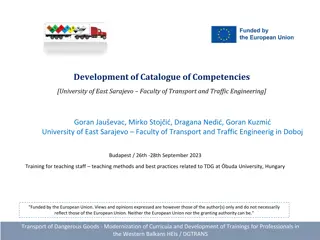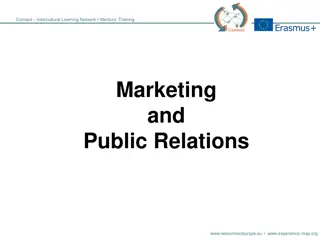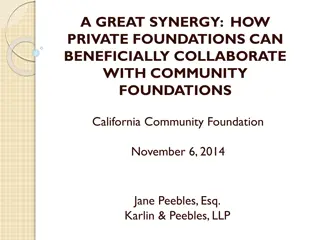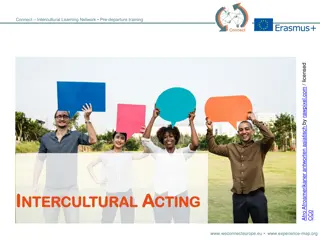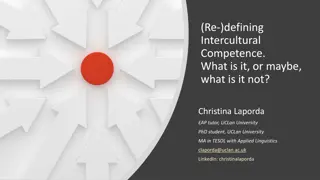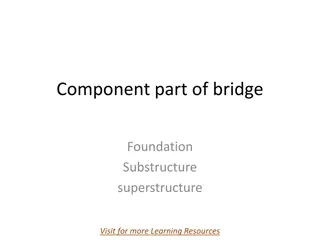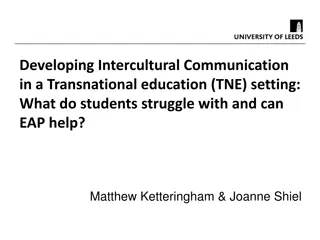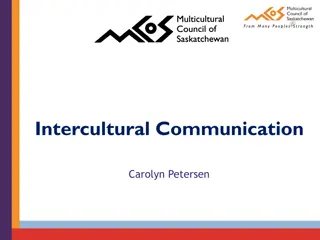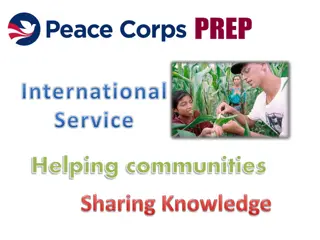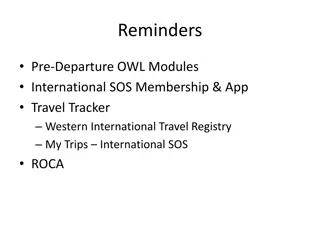Research Foundations: Intercultural Competencies and Model
This research delves into the essence of intercultural competencies, focusing on improving human interactions across differences within societies and beyond borders. It explores a dynamic combination of values, attitudes, knowledge, and skills necessary for effective cross-cultural communication and behavior. The model emphasizes empathy, appropriate behavior in diverse cultural contexts, capacity for multiple perspectives, cultural awareness, and fostering openness and curiosity. Additionally, it presents a rubric from the DARE+ project for understanding and assessing intercultural competencies.
Uploaded on Apr 08, 2025 | 1 Views
Download Presentation

Please find below an Image/Link to download the presentation.
The content on the website is provided AS IS for your information and personal use only. It may not be sold, licensed, or shared on other websites without obtaining consent from the author.If you encounter any issues during the download, it is possible that the publisher has removed the file from their server.
You are allowed to download the files provided on this website for personal or commercial use, subject to the condition that they are used lawfully. All files are the property of their respective owners.
The content on the website is provided AS IS for your information and personal use only. It may not be sold, licensed, or shared on other websites without obtaining consent from the author.
E N D
Presentation Transcript
Towards IO1: Research Foundations, App Structure, Data Analysis Research Foundations, App Structure, Data Analysis Sabine Zwaans, Robert Wagenaar and Maria Yarosh Kiel, 27 September 2021
(1) Research foundations (2) App structure (3) Data Analysis (Questionnaire 2) (4) Next steps
Research foundations Def: 1) intercultural competencies in essence are about improving human interactions across difference, whether within a society (differences due to age, gender, religion, socio-economic status, political affiliation, ethnicity, and so on) or across borders [UNESCO, 2020] 2) a dynamic combination of values, attitudes, knowledge, skills and any other types of elements that permit a person to communicate and behave both effectively and appropriately with those different from him/herself [DARE+: Yarosh, Gonz lez & Deardorff, 2017]
2 1 Research foundations 3 Model & Rubric: 6 4 5 (1) Attitudes 1 Cognitive dimension (2) 1 Level 1 Level 2 Level 3 Behavioural dimension (3) 2 3
Research foundations Model EMPATHY CHOOSING APPROPRIATE & EFFECTIVE BEHAVIOUR IN DIFFERENT CULTURAL CONTEXTS CAPACITY TO SEE FROM MORE THAN ONE PERSPECTIVE CULTURAL AWARENESS KNOWING HOW TO LEARN ABOUT A CULTURE & FURTHER DEVELOP IC OPENNESS & CURIOSITY RESPECT
Research foundations Rubric DARE+ Project Publication avaliable here Source:
Research foundations Rubric DARE+ Project Publication avaliable here Source:
Research foundations Rubric DARE+ Project Publication avaliable here Source:
Research foundations 11 Goals OPENNESS & CURIOSITY 1) I am keen to interact with persons from other cultures and I actively seek to learn more about different cultures RESPECT 2) I am respectful towards persons who are different from me and I believe that cultural diversity is an asset
Research foundations 11 Goals CULTURAL AWARENESS 3) I am aware of the fact that persons from different backgrounds consider different ways of behaviour appropriate in the same situation. I can notice when such differences manifest themselves 4) I am aware that some of my own behaviours and reactions are only normal in my own country and I can detect situations when my behaviours or reactions are perceived as strange by persons from other cultures 5) I am aware of my own prejudices and stereotypes or fixed ideas that might prevent me from behaving in a flexible way in new cultural environments
Research foundations 11 Goals KNOWING HOW TO LEARN ABOUT A CULTURE & FURTHER DEVELOP IC 6) I feel comfortable discussing cultural differences - differences in what persons from different backgrounds would consider normal in particular situations 7) I can name my own strengths in relation to interacting and working with persons from different backgrounds. I can give examples of situations where I have demonstrated these strengths 8) I know how I can become better at interacting and working with persons from different backgrounds - what I need to focus on and what to do in order to improve
Research foundations 11 Goals CAPACITY TO SEE FROM MORE THAN ONE PERSPECTIVE 9) I am capable of seeing things from different perspectives - my own and that of persons from another country; and can often explain where two particular cultural perspectives differ EMPATHY 10) I am empathetic - I can find out how persons from different cultures feel in a given situation and take their feelings into account
Research foundations 11 Goals CHOOSING APPROPRIATE & EFFECTIVE BEHAVIOUR IN DIFFERENT CULTURAL CONTEXTS 11) I am flexible - I am able to modify my behaviour and act in a way that will not offend persons from other cultures, while still permitting me to reach my goals
Research foundations app functions Reflection Experience Learning/Development Language /lens IC is a competence, it be developed Name; focus on what matters & know your strenghts
App structure The App structure follows the three phases of the experience: Pre-Mobility Part During-Mobility Part Post-Mobility Part
Pre Pre- -part part 1. What would you like to get out of the mobility experience? Response 1 Video/ follow-up message Response 2 2. Is there something you are worried about in relation to the upcoming mobility/exchange experience? Response 3-10 3. How can this APP help me?
During During- -part part 3 Sections and 2 features: Section 1: Become an intercultural detective Section 2: Take note of your own achievements Section 3: Make the most of your international experience! Feature 1: Learning from weird and often embarrassing experiences Feature 2: Achievements Gallery
Become an intercultural detective Introduction Your version of the story I want to solve this mystery Other versions of the story So what happened? Mystery solved! Learning from weird and often embarrasing experiences
Take note of your own achievements Goal 1 I did something today/during that shows I AM and I DO Text I believe I am growing in this respect Text Goal 2 I might be becoming better in this, but I am not sure Goal 3 Text I am not sure what it means Text Goal 4 I would like to become like this, but I am not sure how Text Goal 5-11 Achievements Gallery
Make the most of your international experience! - Users receive an encouraging audio-visual message when opening this section
Learning from weird and often embarrassing experiences Story from InterACT collection Story 1 Story 2 Story
Achievements Gallery - Claim awards/achievements for each of the 11 Goals - Note down the experience for which they claim an Achievement (?)
Post Post- -part part POST1. Reflect on the experience and own growth [cf. Achievements Gallery], do post-mobility self-assessment to create a InterACT IC certificate Goal 1 Goal 1 5 1 5 10 Goal 2 7 Goal 2 1 5 10 POST2. Tips on how to keep having intercultural experiences and continue developing IC
Data Analysis: Qnre 2 28 respondents: yEUth, EKO, KulturLife 1) What want to get out of the exchange experience 2) What worries participants might have (related to intercultural interactions) 3) Stories for everyone to learn from [for the Learning from weird and often embarassing experiences collection]
Data Analysis: Expectations Pre-part >>> (1) What would you like to get out of the exchange/mobility experience? [1] Make new friends and learn about their lives [2] Have new experiences [3] Learn about other cultures [4] Learn more about myself [5] Become more self-confident and independent [6] Become better at living, working & interacting with persons different from myself [7] Learn how to fit in well in a new group/environment [8] Come back with a stronger CV [9] Get out of my comfort zone. Clallenge myself [10] See my own country and culture differently
Data Analysis: Worries Pre-part >>> (2) Is there something you are worried about in relation to the upcoming mobility/exchange experience? [1] Feeling lonely: not fitting in/not getting along with persons/not making friends [2] Not being ready for what will happen [3] Finding it too much [4] Not being able to understand others or make myself understood [5] Making silly mistakes and being laughted at [6] Not really (?)
Data Analysis: Stories to learn from During part >>> Learning from weird and often embarassing experiences [1] description of what happened: context, persons involved, actions [2] own perspective: what made me I feel upset/ uncomfortable [3] take away: the 2nd perspective & cultural differences discovered
At my first party after I arrived, everyone was dancing with each other close. One guy tried to dance with me. I did not want to dance so I told him and he could not understand why. I felt really uncomfortable with the situation because I have never seen the guy before, who wanted to dance close with me. I had the impression that he wanted more in a sexual way from me, as a girl. [Later] I understood that our cultures are different on this topic. I already felt a bit sexually harassed, but he just wanted to dance and have a good time. I also realised that each person has an own, personal border. I felt uncomfortable with being so close to another person, but for this person it was totally normal.
The school year in the USA had started and a guy I met in my high school asked me out for the homecoming dance. I agreed to go with him. When I told my host parents about it, they said they need to meet him and ask him questions before I am allowed to go anywhere with him. Why I was surprised and a bit upset/embarrassed: I was used to my parents trusting me to make my own choices of who I hang out with. I felt very supervised by my host parents and also embarrassed to ask the boy to come over just so they could ask him uncomfortable questions. What I found out later: For my host parents, this was a normal thing to do. They wanted to make sure I am in safe hands and would do the same with people their own children go out with. They knew a lot of gossip about the families from school and had strong opinions on who is good to spend time with, and who isn t. The boy was not surprised that my host parents want to meet him before we go out, to him it was no issue.
Once it happened something that made me feel a bit angry. The whole team was living all together in a little house in the forest, there was just one floor available for everyone. One day I woke up and I saw that the whole floor was full of people sit[ting] there: they were praying and I could not go down and have breakfast. It turned out that the Pakistan team had to pray at a certain time and we needed to stay in the room to not interrupt them. At the end we talked with the Pakistan team and they were really thankful for our behaviour and the respect we showed them.
Next steps content-wise: Pre-Part STEP/TASK WHEN WHO Draft follow-up messages for the 8/10 response options for expectations and the 6 response options for worries Upcoming months (to be ready 2 weeks before Feb 2022 Meeting) RUG Validate appropriateness for the target audience The 2 drafted in Kiel? The rest by Feb meeting All InterACT Youth Organisations Translate into InterACT languages March-April 2022 Create animations/videos Neco Create an intro for the app what can this app do, how it is structured, etc. (draft validate translate create) Once the rest of the app is ready All
Next steps content-wise: During-Part STEP/TASK WHEN WHO Obtain comments on the drafted texts for the Tracking your own progress section (Goals 1-4) In Kiel Write up the rest of the texts for the Tracking your own progress section Translate these texts create animations/audio-visual versions (?) Make sure the Make the most of your stay abroad section is relevant and contains the message you would like participants to get Look for an easy-to-follow explanation about cultural dimensions Keep collecting Mysteries for the Learning from weird and often embarassing experiences section (collect, write up, give headings, give the final format) Some in Kiel?
Next steps content-wise: Now Feedback from Youth Workers on 1) What would you like to get out of the exchange/mobility experience? Make new friends and learn about their lives Come back with a stronger CV 5 pairs/ small groups 2) Texts for Goals 1-4 (5 short texts per Goal)
